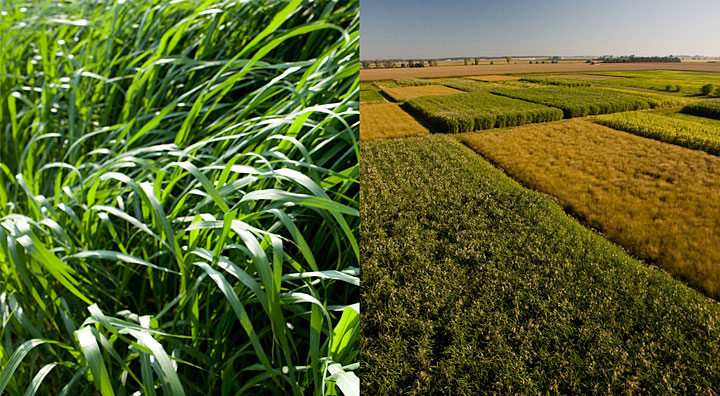DOE Grants $10.6 Million to Produce More Biodiesel, Biojet Fuel
February 27, 2018
 enlarge
enlarge
University of Illinois research project Renewable Oil Generated with Ultra-productive Energycane (ROGUE) will transform energycane and Miscanthus (pictured) into sustainable sources of biodiesel and biojet fuel with support from the U.S. Department of Energy.
Brookhaven National Laboratory is a partner in this new DOE Office of Science, Office of Biological and Environmental Research-funded Biosystems Design project led by the University of Illinois. Brookhaven scientists will work on different aspects of plant science related to increasing the production of sustainable fuels. Lead Brookhaven Lab researcher John Shanklin will design strategies to increase the accumulation of fatty acids and oils in energy cane that can be extracted and converted into biodiesel. The team will also analyze the oil content of oil from experimental materials to evaluate the success of various oil-enhancing strategies.
The U.S. Department of Energy (DOE) awarded the University of Illinois a $10.6 million, five-year grant to transform two of the most productive crops in America into sustainable sources of biodiesel and biojet fuel. The new research project Renewable Oil Generated with Ultra-productive Energycane—or ROGUE—kicks off on Feb. 25 with a team meeting held in conjunction with the 2018 Genomic Sciences Program Annual Principal Investigator Meeting in Tysons, Virginia.
“The U.S. continues to enjoy cheap, abundant energy but more than 80 percent of which is derived from natural gas, coal, and petroleum,” said ROGUE Director Stephen Long, an Ikenberry Endowed Chair at Illinois. “Heavy, diesel-powered semitrailers and the aviation industry desire other options, but electric batteries are not feasible, and current biofuel crops cannot meet demands for biodiesel and biojet fuel.”
Bioenergy
ROGUE will engineer energycane, a bioenergy crop derived from sugarcane, and Miscanthus to produce the oil that is used to create biodiesel and biojet fuel. Their work is guided by computer models, which project that these crops can achieve 20 percent oil content in the plant—a dramatic increase from natural levels of less than a tenth of one percent.
“If fully successful, these crops could produce as much as 15 times more biodiesel per unit of land compared to soybeans, a food crop that currently produces half of our nation’s biodiesel,” Long said, who leads the project’s efforts at the Carl R. Woese Institute for Genomic Biology.
Previous work, funded by the DOE Advanced Research Projects Agency-Energy (ARPA-E), achieved 8 percent oil accumulation, and now ROGUE will further increase oil production and target oil accumulation in the stem where it can be accessed more easily with ROGUE’s patented extraction technologies.
“Redirecting these plants to produce oil rather than sugar will enable us to make full use of these productive crops for biodiesel and biojet fuel production,” Li-Qing Chen, an assistant professor of plant biology at Illinois.
Sustainability
ROGUE will also improve the efficiency that these crops can turn the sun’s energy into plant energy to fuel their biological oil production. Improving these crops’ photosynthetic efficiency will ensure that the production of energy-dense oil will not lower yields or suppress plant defenses. Improving photosynthetic efficiency will also help the plant conserve limited resources such as water and nitrogen, particularly under stress.
“Photosynthesis is the process ultimately underlying the production of all our food and much of our fiber and increasing amounts of our fuels,” said Don Ort, Robert Emerson Professor in Plant Biology and Crop Sciences, who will co-lead the project’s photosynthetic work with Long. “By improving this process, we can fortify these crops to create a more efficient, productive, and sustainable source of bioenergy.”
Technology
ROGUE will translate its bioenergy and sustainability discoveries into energycane and Miscanthus using synthetic biology, which applies engineering principles to optimize and speed up the design of biological systems. The project will also develop energycane to be more cold-tolerant to expand its growing region and extend its growing season.
“Our crop technologies could thrive on 235 million acres, turning untold underutilized, marginal acreage into sustainable sources of bio-oil,” Long said. “What’s more, we have the existing infrastructure in place to immediately grow, harvest, and process their bio-oil using existing sugarcane mills. These oils can be processed into biofuels with existing technologies and sold through existing marketplaces.”
Efficacy
ROGUE will ensure the efficacy of its crop technologies through techno-economic analyses and replicated field trials. Energycane will be evaluated at Florida and Mississippi, and Miscanthus will be tested at Illinois. In tandem, the project will continue to perfect and evaluate its patented method to separate oil from biomass and its processing technologies.
“According to our models, ROGUE crops will be much more productive and profitable per acre than corn or soybeans,” said Vijay Singh, director of the Integrated Bioprocessing Research Laboratory, who will lead the project’s techno-economic analyses and processing technologies.
ROGUE is a collaboration amongst researchers from Illinois as well as Brookhaven National Lab, University of Florida, and Mississippi State University, with support from the DOE Office of Science (Office of Biological and Environmental Research).
Renewable Oil Generated with Ultra-productive Energycane (ROGUE) is engineering the two most productive American crops to produce a sustainable supply of biodiesel, biojet fuel, and bioproducts with support from the U.S. Department of Energy Office of Science (Office of Biological and Environmental Research).
News sources:
- Stephen Long, 217-244-0881, slong@illinois.edu
- Donald Ort, 217-333-2093, d-ort@illinois.edu
- Vijay Singh, 217-333-9510, vsingh@illinois.edu
News writer:
- Claire Benjamin, 217-244-0941, claire@illinois.edu
2018-12784 | INT/EXT | Newsroom










